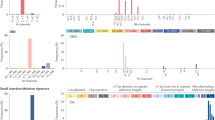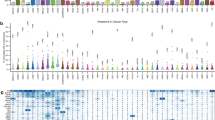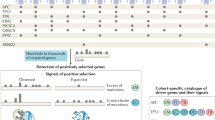Abstract
Systematic efforts are underway to decipher the genetic changes associated with tumor initiation and progression1,2. However, widespread clinical application of this information is hampered by an inability to identify critical genetic events across the spectrum of human tumors with adequate sensitivity and scalability. Here, we have adapted high-throughput genotyping to query 238 known oncogene mutations across 1,000 human tumor samples. This approach established robust mutation distributions spanning 17 cancer types. Of 17 oncogenes analyzed, we found 14 to be mutated at least once, and 298 (30%) samples carried at least one mutation. Moreover, we identified previously unrecognized oncogene mutations in several tumor types and observed an unexpectedly high number of co-occurring mutations. These results offer a new dimension in tumor genetics, where mutations involving multiple cancer genes may be interrogated simultaneously and in 'real time' to guide cancer classification and rational therapeutic intervention.
NOTE: In the version of this article initially published, the name of an author was spelled incorrectly as Laura MacConnaill. The correct spelling is Laura MacConaill. The error has been corrected in the HTML and PDF versions of the article.
This is a preview of subscription content, access via your institution
Access options
Subscribe to this journal
Receive 12 print issues and online access
$209.00 per year
only $17.42 per issue
Buy this article
- Purchase on Springer Link
- Instant access to full article PDF
Prices may be subject to local taxes which are calculated during checkout


Similar content being viewed by others
Change history
14 March 2007
NOTE: In the version of this article initially published, the name of an author was spelled incorrectly as Laura MacConnaill. The correct spelling is Laura MacConaill. The error has been corrected in the HTML and PDF versions of the article.
References
National Human Genome Research Institute. Cancer Sequencing. 〈http://www.genome.gov/cancersequencing/〉 (2006).
Sjoblom, T. et al. The consensus coding sequences of human breast and colorectal cancers. Science 314, 268–274 (2006).
National Cancer Institute and National Human Genome Research Institute. The Cancer Genome Atlas. 〈http://cancergenome.nih.gov/index.asp〉 (2006).
Heinrich, M.C. et al. Kinase mutations and imatinib response in patients with metastatic gastrointestinal stromal tumor. J. Clin. Oncol. 21, 4342–4349 (2003).
Thomas, R.K. et al. Detection of oncogenic mutations in the EGFR gene in lung adenocarcinoma with differential sensitivity to EGFR tyrosine kinase inhibitors. Cold Spring Harb. Symp. Quant. Biol. 70, 73–81 (2005).
Paez, J.G. et al. EGFR mutations in lung cancer: correlation with clinical response to gefitinib therapy. Science 304, 1497–1500 (2004).
Pao, W. et al. EGF receptor gene mutations are common in lung cancers from “never smokers” and are associated with sensitivity of tumors to gefitinib and erlotinib. Proc. Natl. Acad. Sci. USA 101, 13306–13311 (2004).
Lynch, T.J. et al. Activating mutations in the epidermal growth factor receptor underlying responsiveness of non-small-cell lung cancer to gefitinib. N. Engl. J. Med. 350, 2129–2139 (2004).
Solit, D.B. et al. BRAF mutation predicts sensitivity to MEK inhibition. Nature 439, 358–362 (2006).
Thomas, R.K. et al. Sensitive mutation detection in heterogeneous cancer specimens by massively parallel picoliter reactor sequencing. Nat. Med. 12, 852–855 (2006).
Bansal, A. et al. Association testing by DNA pooling: an effective initial screen. Proc. Natl. Acad. Sci. USA 99, 16871–16874 (2002).
Werner, M. et al. Large-scale determination of SNP allele frequencies in DNA pools using MALDI-TOF mass spectrometry. Hum. Mutat. 20, 57–64 (2002).
Kralovics, R. et al. A gain-of-function mutation of JAK2 in myeloproliferative disorders. N. Engl. J. Med. 352, 1779–1790 (2005).
Levine, R.L. et al. Activating mutation in the tyrosine kinase JAK2 in polycythemia vera, essential thrombocythemia, and myeloid metaplasia with myelofibrosis. Cancer Cell 7, 387–397 (2005).
James, C. et al. A unique clonal JAK2 mutation leading to constitutive signalling causes polycythaemia vera. Nature 434, 1144–1148 (2005).
Baxter, E.J. et al. Acquired mutation of the tyrosine kinase JAK2 in human myeloproliferative disorders. Lancet 365, 1054–1061 (2005).
Chesi, M. et al. Frequent translocation t(4;14)(p16.3;q32.3) in multiple myeloma is associated with increased expression and activating mutations of fibroblast growth factor receptor 3. Nat. Genet. 16, 260–264 (1997).
Nakahara, M. et al. A novel gain-of-function mutation of c-kit gene in gastrointestinal stromal tumors. Gastroenterology 115, 1090–1095 (1998).
Heinrich, M.C. et al. Molecular correlates of imatinib resistance in gastrointestinal stromal tumors. J. Clin. Oncol. 24, 4764–4774 (2006).
Ikediobi, O.N. et al. Mutation analysis of 24 known cancer genes in the NCI-60 cell line set. Mol. Cancer Ther. 5, 2606–2612 (2006).
Lee, J.C. et al. EGFR activation in glioblastoma through novel missense mutations in the extracellular domain. PLoS Med. 3, e485 (2006).
Wan, P.T. et al. Mechanism of activation of the RAF-ERK signaling pathway by oncogenic mutations of B-RAF. Cell 116, 855–867 (2004).
Weinstein, I.B. & Joe, A.K. Mechanisms of disease: oncogene addiction--a rationale for molecular targeting in cancer therapy. Nat. Clin. Pract. Oncol. 8, 448–457 (2006).
Bamford, S. et al. The COSMIC (Catalogue of Somatic Mutations in Cancer) database and website. Br. J. Cancer 91, 355–358 (2004).
Jiang, J. et al. Identification and characterization of a novel activating mutation of the FLT3 tyrosine kinase in AML. Blood (2004).
Naoki, K., Chen, T.H., Richards, W.G., Sugarbaker, D.J. & Meyerson, M. Missense mutations of the BRAF gene in human lung adenocarcinoma. Cancer Res. 62, 7001–7003 (2002).
Paez, J.G. et al. Genome coverage and sequence fidelity of phi29 polymerase-based multiple strand displacement whole genome amplification. Nucleic Acids Res. 32, e71 (2004).
Acknowledgements
We thank E. Lander and G. Getz for comments and advice. R.K.T. is a Mildred-Scheel fellow of the Deutsche Krebshilfe. R.K.T. is supported by the International Association for the Study of Lung Cancer (IASLC). R.M.D. is supported by the Swiss national science foundation (no: 3100A0-103671/1). A.G and J.M. are supported by the National Cancer Institute through SPORE grant P50CA70907. G.D.D. is supported by the Virginia and Daniel K. Ludwig Trust for Cancer Research, the Quick Family Fund for Cancer Research and the Ronald O. Perelman Fund for Cancer Research at Dana-Farber. I.K.M. and P.S.M. are supported by Accelerate Brain Tumor Cure. I.K.M., L.M.L, T.F.C., and P.S.M. are supported by the Henry E. Singleton Brain Tumor Program. I.K.M., L.M.L, T.F.C., S.F.N., M.M., W.R.S. and P.S.M. are supported by the Brain Tumor Funders' Collaborative. M.M. and L.A.G. are supported by a grant from Genentech, Inc. M.M. is supported by the American Cancer Society. L.A.G is supported by the National Cancer Institute, the Prostate Cancer Foundation, the Burroughs-Wellcome Fund, the Robert Wood Johnson Foundation and the Novartis Institute for Biomedical Research.
Author information
Authors and Affiliations
Corresponding author
Ethics declarations
Competing interests
The authors declare no competing financial interests.
Supplementary information
Supplementary Fig. 1
Distribution of peak height ratios for recurrent oncogene point mutations. (PDF 1731 kb)
Supplementary Fig. 2
Mutation prevalence as determined by high-throughput genotyping. (PDF 666 kb)
Supplementary Fig. 3
Distribution of oncogene mutations by gene. (PDF 1275 kb)
Supplementary Fig. 4
Oncogene mutation prevalence by tumor type. (PDF 2953 kb)
Supplementary Table 1
Oncogene mutations and nucleotide changes. (XLS 120 kb)
Supplementary Table 2
Oncogene mutation peak height ratios. (XLS 75 kb)
Supplementary Table 3
Oncogene mutation assay completion. (XLS 51 kb)
Rights and permissions
About this article
Cite this article
Thomas, R., Baker, A., DeBiasi, R. et al. High-throughput oncogene mutation profiling in human cancer. Nat Genet 39, 347–351 (2007). https://doi.org/10.1038/ng1975
Received:
Accepted:
Published:
Issue Date:
DOI: https://doi.org/10.1038/ng1975
This article is cited by
-
A combined opposite targeting of p110δ PI3K and RhoA abrogates skin cancer
Communications Biology (2024)
-
The Oncology Biomarker Discovery framework reveals cetuximab and bevacizumab response patterns in metastatic colorectal cancer
Nature Communications (2023)
-
Deciphering the molecular mechanistic paths describing the chemotherapeutic potential and epigenetic regulation of curcumin in lung cancer: a mini review
Naunyn-Schmiedeberg's Archives of Pharmacology (2023)
-
Molecular genomic landscape of pediatric solid tumors in Chinese patients: implications for clinical significance
Journal of Cancer Research and Clinical Oncology (2023)
-
Impact of GTF2H1 and RAD54L2 polymorphisms on the risk of lung cancer in the Chinese Han population
BMC Cancer (2022)



